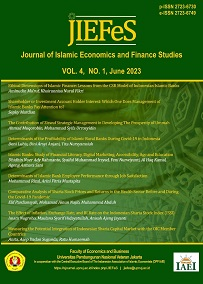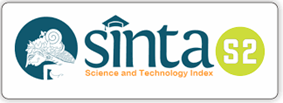Shareholder or Investment Account Holder Interest: Which One Does Management of Islamic Banks Pay Attention to?
DOI:
https://doi.org/10.47700/jiefes.v4i1.5790Keywords:
Corporate Governance, Investment Accound Holder, Performance, StakeholderAbstract
Governance and performance studies are often viewed from the perspective of shareholders, including in Islamic banks. However, the Investment Account Holders (IAH) are equally important stakeholders. Profit-sharing contracts, the absence of representation in the Annual General Meeting, and larger fund amount place the IAH at greater risk. In reality, the impact of governance should also prioritize protecting their interests. This study examines the effect of implementing corporate governance on the performance of Islamic banks from the perspective of shareholders and IAHs. This study tabulates data from the annual reports of 14 Indonesian Islamic banks. This research has found that Islamic bank governance has no effect on performance from the perspective of IAHs. On the other hand, governance can significantly influence performance from a shareholder perspective. From the perspective of stakeholder theory, these findings explain that Islamic banks have not made IAHs the main party to pay attention to. Business policies and strategies that are overseen by corporate governance have not had an impact on wider stakeholders. The IAHs in Islamic banks should also be categorized as key stakeholders.
References
Abdel-Baki, M. and Sciabolazza, V. L. (2014) ‘A consensus-based corporate governance paradigm for Islamic banks’, Qualitative Research in Financial Markets. Emerald Group Publishing Limited, 6(1), pp. 93–108.
Abdul-Rahman, A. et al. (2014) ‘Failure and potential of profit-loss sharing contracts: A perspective of New Institutional, Economic (NIE) Theory’, Pacific-Basin Finance Journal. Elsevier, 28, pp. 136–151.
Ajili, H. and Bouri, A. (2018) ‘Corporate governance quality of Islamic banks: measurement and effect on financial performance’, International Journal of Islamic and Middle Eastern Finance and Management, 11(3), pp. 470–487. doi: 10.1108/IMEFM-05-2017-0131.
Alhammadi, S. (2016) Corporate Governance Dilemma with Unrestricted Profit Sharing Investment Accounts in Islamic Banks. University of Reading.
Almutairi, A. R. and Quttainah, M. A. (2017) ‘Corporate governance: evidence from Islamic banks’, Social Responsibility Journal. Emerald Publishing Limited, 13(3), pp. 601–624.
Archer, S., Ahmed, R. and Karim, A. (2009) ‘Profit-sharing investment accounts in Islamic banks : Regulatory problems and possible solutions’, Journal of Banking Regulation, 10, pp. 300–306. doi: 10.1057/jbr.2009.9.
Bank Indonesia (2010) Surat Edaran Bank Indonesia No. 12/13/DPbS/2010 Perihal Pelaksanaan Good Corporate Governance bagi Bank Umum Syariah dan Unit Usaha Syariah. Indonesia.
Bernerth, J. B. and Aguinis, H. (2016) ‘A critical review and best-practice recommendations for control variable usage’, Personnel Psychology. Wiley Online Library, 69(1), pp. 229–283.
Buana, G. K., Hudaefi, F. A. and Caraka, R. E. (2020) Islamic Banking Performance: A Bibliometric Review. doi: 10.20944/preprints202012.0056.v1.
Farag, H., Mallin, C. and Ow-Yong, K. (2018) ‘Corporate governance in Islamic banks: New insights for dual board structure and agency relationships’, Journal of International Financial Markets, Institutions and Money. Elsevier, 54(1), pp. 59–77.
Freeman, R. E., Phillips, R. and Sisodia, R. (2020) ‘Tensions in Stakeholder Theory’, Business and Society, 59(2), pp. 213–231. doi: 10.1177/0007650318773750.
Freudenreich, B., Lüdeke-Freund, F. and Schaltegger, S. (2020) ‘A Stakeholder Theory Perspective on Business Models: Value Creation for Sustainability’, Journal of Business Ethics. Springer Netherlands, 166(1), pp. 3–18. doi: 10.1007/s10551-019-04112-z.
Grassa, R. (2015) ‘Shariah supervisory systems in Islamic finance institutions across the OIC member’, Journal of Financial Regulation and Compliance, 23(2), pp. 135–160.
Gujarati, D. N. (2003) Basic Econometrics. Singapore: McGraw-Hill, Boston.
Hair, J. F. et al. (2010) Multivariate data analysis: A global perspective. Pearson Upper Saddle River, NJ.
Hakimi, A. et al. (2018) ‘Do board characteristics affect bank performance? Evidence from the Bahrain Islamic banks’, Journal of Islamic Accounting and Business Research. Emerald Publishing Limited, 9(2), pp. 251–272.
Hamza, H. (2016) ‘Does investment deposit return in Islamic banks reflect PLS principle?’, Borsa Istanbul Review. Elsevier, 16(1), pp. 32–42.
Kusuma, H. and Ayumardani, A. (2016) ‘The corporate governance efficiency and Islamic bank performance: an Indonesian evidence’, Polish journal of management studies, 13(1), pp. 111–120. doi: 10.17512/pjms.2016.13.1.11.
Mollah, S. et al. (2017) ‘The governance, risk-taking, and performance of Islamic banks’, Journal of financial services research. Springer, 51(2), pp. 195–219.
Mollah, S. and Zaman, M. (2015) ‘Shari’ah supervision, corporate governance and performance: Conventional vs. Islamic banks’, Journal of Banking & Finance. Elsevier, 58(1), pp. 418–435.
Musibah, A. S. and Alfattani, W. S. B. W. Y. (2014) ‘The mediating effect of financial performance on the relationship between Shariah supervisory board effectiveness, intellectual capital and corporate social responsibility, of Islamic banks in Gulf Cooperation Council countries’, Asian Social Science. Canadian Center of Science and Education, 10(17), p. 139.
Nguyen, T., Locke, S. and Reddy, K. (2014) ‘A dynamic estimation of governance structures and financial performance for Singaporean companies’, Economic Modelling, 40, pp. 1–11. doi: 10.1016/j.econmod.2014.03.013.
Nomran, N. M. and Haron, R. (2020) ‘A systematic literature review on Shari’ah governance mechanism and firm performance in Islamic banking’, Islamic Economic Studies. Emerald Publishing Limited, 27(2), pp. 91–123. doi: 10.1108/IES-06-2019-0013.
Nomran, N. M., Haron, R. and Hassan, R. (2018) ‘Shari’ah supervisory board characteristics effects on Islamic banks performance’, International Journal of Bank Marketing. Emerald Publishing Limited, 36(2), pp. 290–304.
Otoritas Jasa Keuangan (2017) Surat Edaran Otoritas Jasa Keuangan Nomor 13/SEOJK.03/2017 tentang Penerapan Tata Kelola Bagi Bank Umum. Indonesia.
Qoyum, A. et al. (2021) ‘Does the islamic label indicate good environmental, social, and governance (ESG) performance? Evidence from sharia-compliant firms in Indonesia and Malaysia’, Borsa Istanbul Review. Elsevier Ltd. doi: 10.1016/j.bir.2021.06.001.
Zeineb, G. Ben and Mensi, S. (2018) ‘Corporate governance, risk and efficiency: Evidence from GCC Islamic banks’, Managerial Finance. Emerald Publishing Limited, 44(5), pp. 551-569.
Downloads
Published
Issue
Section
License
Copyright (c) 2023 Sepky Mardian

This work is licensed under a Creative Commons Attribution 4.0 International License.
Authors who publish with this journal agree to the following terms:
- Authors retain copyright and grant the journal right of first publication with the work simultaneously licensed under a Creative Commons Attribution 4.0 International License that allows others to share the work with an acknowledgment of the work's authorship and initial publication in this journal.
- Authors can enter into separate, additional contractual arrangements for the non-exclusive distribution of the journal's published version of the work (e.g., post it to an institutional repository or publish it in a book), with an acknowledgment of its initial publication in this journal.
- Authors are permitted and encouraged to post their work online (e.g., in institutional repositories or on their website) before and during the submission process, as it can lead to productive exchanges, as well as earlier and greater citation of published work.

This work is licensed under a Creative Commons Attribution 4.0 International License.











